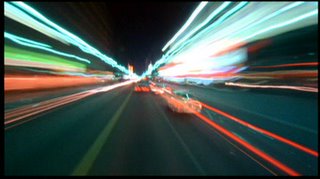Canonball #998: Koyaanisqatsi
 Directed by Godfrey Reggio
Directed by Godfrey Reggio"Inspiration & ideas" from Jacques Ellul, Ivan Illich, David Monongye, Guy Debord and Leopold Kohr.
"The world is moving fast and I'm losing my balance" -- Andre 3000
For an avant-garde film, remarkably square. Godfrey Reggio's (and DP Ron Fricke's) visuals are pretty vacant, relying too much on time-lapse that stopped being innovative half a century before this was made. Philip Glass's (and his conductor Michael Riesman's) soundtrack just trudges along, relying too much on his sub-Human League electronic 'scaping. So from barren mesa to failed space junk, it's even worse than most New Age indulgences because it's convinced of its significance.
And yet its desire to keep moving keeps it watchable, and for a glorious twenty minutes (that's Chapter 10: "The Grid" for you DVD skippers), sight and sound meld into something exhilarating. A time-lapsed pan out over a city at night wakes up the nocturnal Glass, as he lurches into synthbass at double-speed, then throws some choral change-ups, then does both at once, repeatedly switching densities. Meanwhile, as day breaks, we see public thoroughfares like intersections, station stairways and revolving doors, still at super speed. We see cities at work (a smallgoods factory is a recurring setting) and at play (Ms. Pac-Man!) in one of the fairest yet most generous urban cross-sections in a city symphony. And then there is only movement, alleys and motorways we breakneck along until the music suddenly stops, while our momentum keeps us hurtling, leaving us floating high above the city. We have just experienced the joy of scale; the point Reggio is trying to make is the exact opposite of this.
B PLUS

0 Comments:
Post a Comment
<< Home